A very eventful reign for a seemignly quite blunt and straightforward Pope. The highlight of this update has to be the demise of both Ana and Felipe, the nemesis of the Papal States for so long, finally coming to a sticky end, wonderful! I do like Marcellus' constant warring, ineffectual as it nonetheless sometimes seemed. Events in France made for a fantastic read too and now with Jan III taking the throne, the weakening ties to one of the Papacy's strongest allies, Bohemia, leaves everything very interestingly poised.
Single Men - The Holy See MMU
- Thread starter unmerged(90806)
- Start date
-
We have updated our Community Code of Conduct. Please read through the new rules for the forum that are an integral part of Paradox Interactive’s User Agreement.
You are using an out of date browser. It may not display this or other websites correctly.
You should upgrade or use an alternative browser.
You should upgrade or use an alternative browser.
Great update!!!!! Now you need to see if Savoy and Brittany make some conversions. That lonely French Catholic should somehow become Breton.
You should make small countries become Catholic again before coming to the great powers of Austria, France, England and Hungary.
By the way, if Hungary has four religions (Catholic, Protestant, Calvinist and Orthodox) than you could start a religious civil war there.
Can you try to make Bohemia convert those heretics in it's domains, even with this bitter friendship?
In fact make a plan list and make those things and/or others in order to clean that blue and purple ink.
Lastly, you should still try to cede some of your eastern territory to your allies.
And congratulations for the character writer of the week price!!!!
You should make small countries become Catholic again before coming to the great powers of Austria, France, England and Hungary.
By the way, if Hungary has four religions (Catholic, Protestant, Calvinist and Orthodox) than you could start a religious civil war there.
Can you try to make Bohemia convert those heretics in it's domains, even with this bitter friendship?
In fact make a plan list and make those things and/or others in order to clean that blue and purple ink.
Lastly, you should still try to cede some of your eastern territory to your allies.
And congratulations for the character writer of the week price!!!!
loki100:
aldriq:
morningSIDEr:

The Messenger:

Thank you. Honoured.Just to say, I've dropped the character writer of the week award in your lap for this brilliant set of characters ... and my personal favourite so far of Hadrianus VII
aldriq:
Oh why hasn't this crossed my mind!? Awesome idea! Would mess up the Iberian Peninsula too.I know you are not that naughty but... did you think of selling Léon to Portugal instead?
morningSIDEr:
Indeed. After all these struggles there was a bit of anti-climax about it.The highlight of this update has to be the demise of both Ana and Felipe, the nemesis of the Papal States for so long, finally coming to a sticky end, wonderful!
Jan III's accession will bring about a huge change. It looks as if I created a monster the Big Brown(ish) Bohemian Blob.and now with Jan III taking the throne, the weakening ties to one of the Papacy's strongest allies, Bohemia, leaves everything very interestingly poised.
The Messenger:
Stay tuned. Some of your suggestions will be taken into account; albeit with a twist.In fact make a plan list and make those things and/or others in order to clean that blue and purple ink.
This is out of the question. I need power-base to punch. Also, as you'll see, my allies cannot be fully trusted.Lastly, you should still try to cede some of your eastern territory to your allies.
Hadrianus VIII
30 August 1597 – 14 October 1599
NE PUERO ARQEBUSUM
Guarantees
Having Bestowed the title of Most Christian Monarchs on the royal houses of Spain and Bohemia in 1530s ultimately backfired. Instead of strengthening the Catholic camp it led to both powers’ attempts at gaining control over the Papacy. And the Spanish failure was the Bohemian success. Jan III had no qualms about taking advantage of the weakened-by-schism Papacy. Before the conclave of 1597 commenced Imperial envoys requested taking Cardinal Campofregoso as a potential papabile into account. It was like a slap in the face for Camerlengo Adria, now the most respected man in the Curia and the most likely pope-to-be. However, so as not to estrange the Emperor, he had to concede; Cardinal Adria was in no position to oppose since too much was at stake.
As a result Camerlengo Adria, to bewilderment of many, solicited for the cardinal-electors’ support for Cardinal Campofregoso’s candidature. He simply realised disobedience would cost the break of the alliance with the Emperor. Jan III, now basking in the glory as the Catholic champion after the victory over the English alliance, made a clear offer: his creature as a Pope. What he promised in return were guarantees from his alliance, Portugal included. This looked like a fair exchange, not that the Curia was left with any other options. The conclave was a farce; the little-known Cardinal Campofregoso, was elected unanimously. (the cunning bishop of Utrecht wiggled out again; a guarantee from Portugal is welcome as I have no navy to speak of, only five cogs, which is ok in peace time but I fear at war I would have trouble transporting troops over my scattered holdings if fighting a naval power)
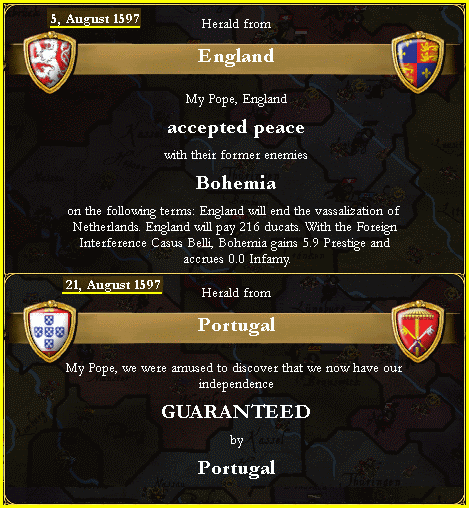
Puppet?
Cardinal Campofregoso, now Hadrianus VIII, might have been a kind of mystery figure in Rome, but he was not a man out of nowhere. He was the Doge of Genoa’s cousin and an able ecclesiastic renown for his managerial skills, to the point of being perceived as thrifty and avaricious by his enemies. This opinion along with the Genoese connection did not bode well for his reception on the Papal throne (the Doge, being a Papal ally, behaved ambiguously during the schism crisis). Hadrianus VIII’s complete dependency on the Emperor did not win him much love either.
None of the important factions in the Curia were happy with this choice. The ‘Orphans’ feared he might neglect the East; the Venetians feared he would favour Genoese interests; the Camerlengo’s men felt their position was threatened; numerous officials, those working in networks created during ‘del Monte’ Papacy and those recently advanced due to Pizzaro’s reforms, worried their prerogatives might be taken away from them. All these concerns proved well-founded. The situation in Rome quickly grew unbearable, there was a silent opposition, hostility even, between Hadrianus VIII and the few men he brought along and the established Papal institutions. (he seems quite competent with all these modifiers, in other circumstances… this 3 DIP helped make my mind how to portray him; also going from nominal to weak papal authority is no doubt some progress)
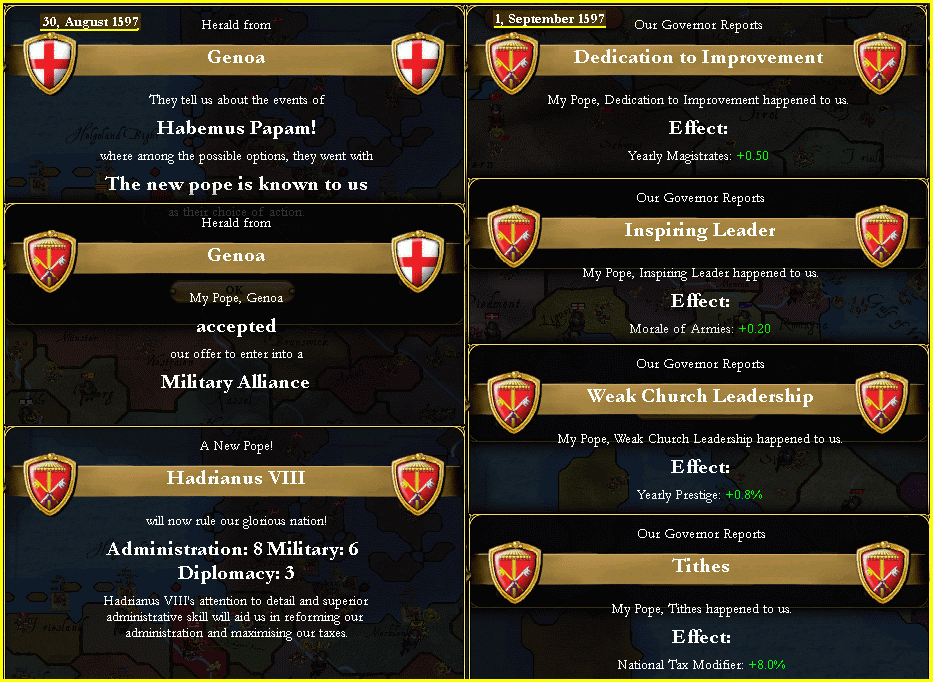
The rise of Bohemia (combined with the marginalisation of Spain) and the creeping weakening of the Papal authority (the failure at bringing Austria and France back to light, the disaster of the Schism) created a new dynamic in Europe. The era of Bohemian-Italian link, with the Papacy representing Italian interests, was over. The old alliance was retained but it transformed the Papal States into the Emperor’s junior ally. For security reasons, Hadrianus VIII let Jan III intervene in the matters of Italy, even if it meant accepting subordinate status within the relationship. This was evident from the very onset of the new pontificate. The Siena crisis was handled skilfully by the Pope, the Genoese way as this strategy of short-term concessions for long-term benefits will be called, but nothing would have been achieved without Jan III’s backing. (I believe I this ‘Brewing revolt’ thing was a threat of breaking the vassalage; the ‘Trade for fidelity’ is not so punishing for me; MM vassals are much more dynamic, thank you Ubik (although in my other game the ‘Bankrupt vassal’ thing fired like ten times in a row! I suspect some loop here; there’s also something about HRE vassals, like Emperor demanding their independence, I guess it’s Helius’s SRI)
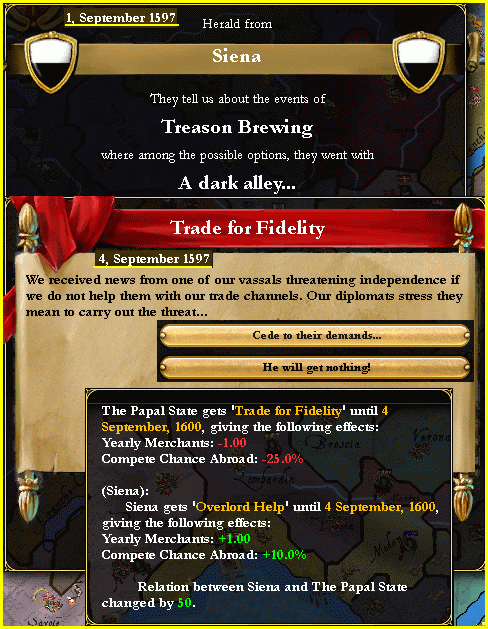
Divided Loyalties
Hadrianus VIII may not have been that badly prepared to rule the Papal States, in fact many point out to his personal merits and stewardship excellence. However, reconciling the conflicting loyalty obligations proved an impossible task for him to accomplish. The resolution of the Siena crisis favoured Genoese merchant houses (those with connection to the Doge himself profited the most) at the expense of the Papal and Venetian ones. It was also because of the Genoese businesses with infidels and heretics that the Pope took a rather lenient stance in the question of ‘dangerous books’. Seemingly, it was in line with the Papal official policy exemplified by ‘The Recommendation’ of 1533, a peculiar document comprising the list of ‘un-recommended’ books; but it was against the practice, much more restrictive as the aftermath of the schism. Understandably, so as not to alienate any of his protectors in the delicate situation of the post-Schism months Hadrianus VIII took a vague stance in the question of conciliarism, which the Schism had brought to the fore.
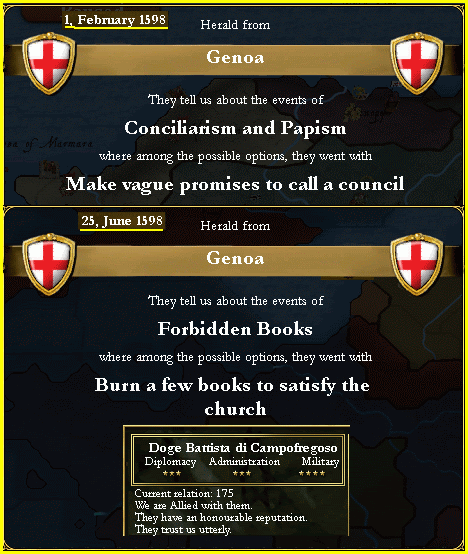
His Holiness, understandably, had to comply with his benefactor the Emperor. Ever since his accession Jan III did not conceal one of his goals was to be crowned and anointed in Rome. There was a massive resistance against the idea in the Curia, but Hadrianus VIII was more than obliging and he commenced the preparations. On the more-an-excuse-than condition that the well-trained Dominicans from the East were granted Imperial maintenance (new monasteries and funding) to intensify the conversion efforts in various heretic-dominated regions of the Empire, Hadrianus VIII bestowed on Jan III the title of the Defender of the True Faith (conveniently held, up to then, by his cousin the Doge). This decision, made against the Curia, shows how shrewd Hadrianus VIII actually could be. In one stroke he got rid of dissidents in the East and placated the Emperor. (I’m no longer the Papal controller so it’s for the Genoese AI to decide; this missionary with under 1% chance thing is irritating, especially as Bohemia has Ecumenism and as the Emperor tolerates all confessions; come to think about it, wouldn’t it be better to get rid of missionaries and refine Dharper’s province decisions system, their biggest plus is the conversion may or may NOT succeed, whereas with missionary even at 0.9% chance sooner or later the conversion will take place)
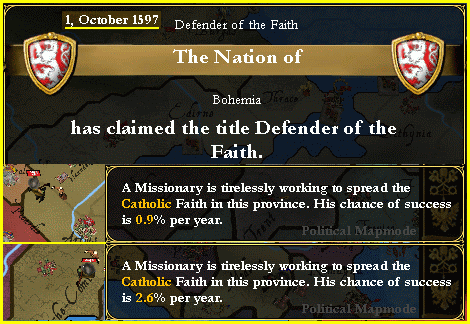
Crises
The short pontificate of Hadrianus VIII went from one crisis to another. It took off inauspiciously with the problems in Siena to proceed through more and more serious predicaments to culminate in the unprecedented Pope’s death. If Siena issue was more of a momentarily nature thing, the dissent in the East had already been building for some time during the directionless reign of the misguided Marcellus II. The process took speed with Hadrianus VIII’s election.
The disgruntled rallied around the Patriarch Grado. This respectable figure, who had contributed largely to bringing prosperity to the East, had been loyal to the ever-absent and thus non-obtrusive Marcellus II. He opposed the new Pope though, not only on the grounds of different political views but also because of wounded pride; the Patriarch hoped to have been elected himself. The rich, modernised and invigorated Constantinople on the one hand rivalled Rome in splendour and political sway (the Imperial pressure was far frailer there whereas the Constantinople’s pressure on the regional politics of Asia Minor and Levant was far stronger than that of Rome’s, or Rome’s in Italy for that matter). On the other hand Constantinople, with ambitions of its own, was slipping away from Rome’s control. This process (and the threat of cession) was cut short by the unexpected Patriarch Grado’s death. (my national focus is still in Constantinople, which is good because only the East contributes to my trade income (so canal projects make sense there), the western provs trade through Venice where I’m unable to break in)
There is no proof but the legend lingers, and the slanderous tale was instrumental in building up the anti-Papal atmosphere. The Knights of Saint John with their much-increased presence in Asia Minor responded directly to the Pope. This independence from Constantinople created resentment in the eastern provinces, especially as many, the Patriarch including, questioned raison d'être of the order, now that the whole Levant, and in fact Eastern Mediterranean was in Christian hands. Worse still, many knights turned to pirating or raiding Christian settlements. These controversies were discussed at the meeting between the Grand Master and the Patriarch on 2 March 1598. The latter did not live to see another day. The talk was about poisoned wine and Papal hand; even Italians believed Hadrianus VIII had been implicated.
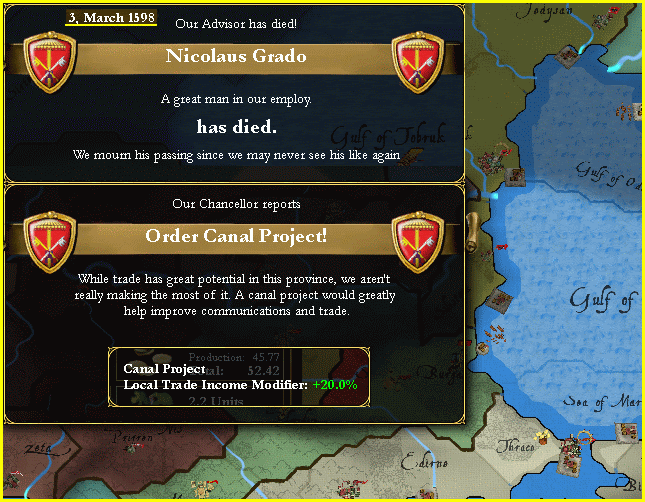
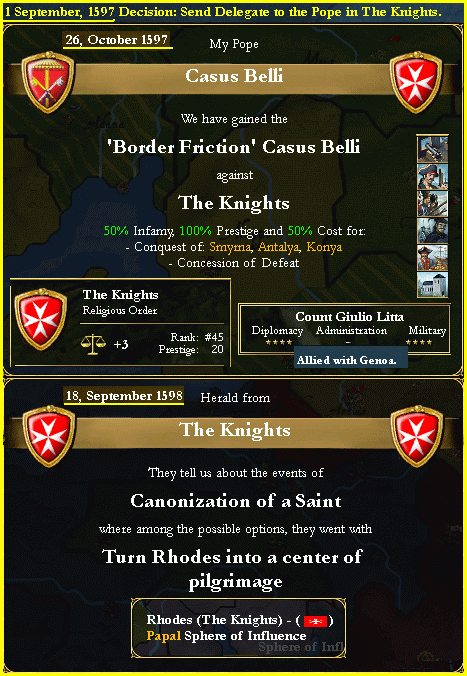
The succession crisis in Austria had almost certainly nothing to do with Hadrianus VIII. But there is no better fuel for rumours and conspiracy theories than successive mysterious deaths. The heir to the Austrian throne died in a hunting accident, but at the time fingers pointed at Rome. Disregarding the obvious fact that His Holiness had no means to orchestrate and execute such an act, Protestants, devastated and enraged, spread the allegations in the most vicious pamphlets. Their indignation was stimulated by fear; the next in line of succession in case of Franz II’s death was Jan III of Bohemia’s uncle, Jiži. Promised to be made the Duke of Silesia, he readily relinquished his claim to the Emperor himself; this sent shockwaves in Vienna and other Protestant courts of Europe.
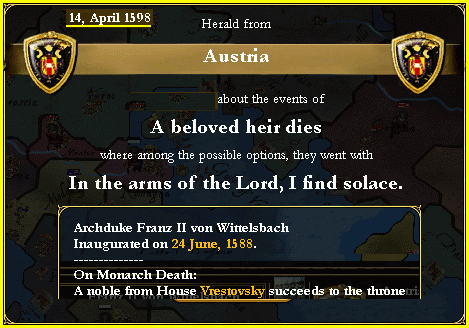
Gaston I d’Anjou of the French ruling dynasty, the most powerful Protestant house in Europe, would not have Bohemia, Low Countries and Austria united under one monarch. Planning a response to this threat of potentially powerful Imperial union cost Gaston I many sleepless nights. He had to add an Iberian allies into equation, and in fact Jan III was allied to Portugal (with its claims in Armagnac) and Spain’s stance was at least uncertain (it was a Catholic power after all). The alarming result for France was the danger of encirclement. And France, itself far from being united, could not handle the Empire-Portugal-Papacy alliance, which the disastrous wars of Louis XIV proved painfully enough. Gaston I decided intimidation of the weakest link in this tightening, smothering chain would be the best course of action. He demanded the province of Avignon from Hadrianus VIII. (wouldn’t it be fun to see Austria under PU with Bohemian Emperor controlling Low Countries too and allied with Portugal instead of Spain? so many funny twists when compared to how it was in OTL; I made sure France hadn’t got completely dismantled, should I regret it now? haven’t I spared a monster?)
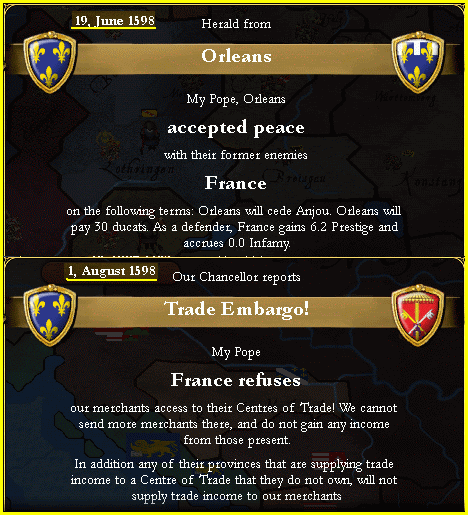
The French war scare made the atmosphere in Rome even more restless. It exposed Hadrianus VIII’s complete dependency on the Emperor. His Holiness sent a dispatch after dispatch to Prague, each subsequent letter revealing his growing nervousness, asking the Emperor to reaffirm his guarantees. Jan III, calculating it played into his interest, stalled for time. The situation became even more complex for all the parties concerned on 15 October 1599 when Hadrianus VIII expired, not having recovered from his bullet wounds.
Firearms of the late 16th century were unreliable but they could prove deadly at close range. Gregorius Chiogga was one of the younger sons of a Venetian family of entrepreneurs, of mixed converted-Jewish and Greek origin. His family business had gone bankrupt as a result of Siena resolution, his father had failed at attempts of starting anew and had committed suicide. Young Chiogga managed to acquire a post in the Papal chancellery. On a few occasions he accompanied Hadrianus VIII in briefings on fiscal matters, so it was on 14 October, when he reckoned he could come up close enough to the Pope to fire. Both shots hit the Pope’s stomach before in the commotion that ensued the assassin got disarmed and detained.
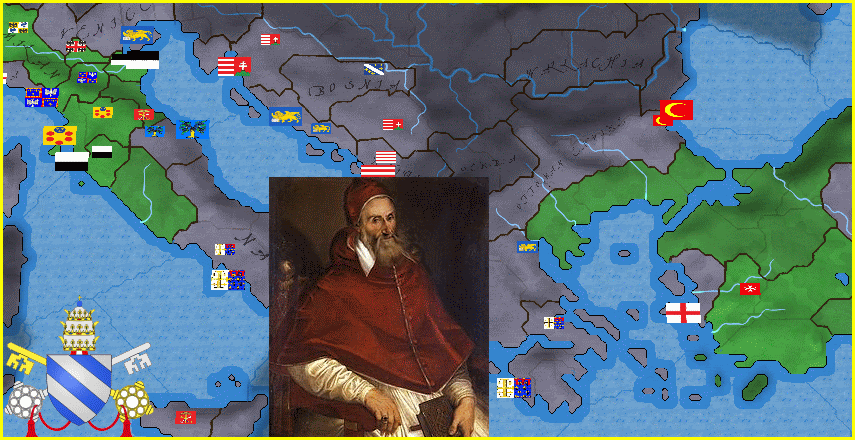
The Papal spheres of influence at the time of Hadrianus VIII's pontificate
Treasury / yearly income: 466d / 107,47
Merchants: 5 in Thrace: 86.44/557.80 and 5 in Alexandria: 95.48/616.14
Fleet: 5: 5 cogs
Army: 23k Reformed tercio; 7k Gallop cavalry
Manpower / discipline: 36.256 / 115.50%
Army / navy tradition: 44.60% / 0.00%
Prestige: 85
Stability: +2
Infamy: 0.00/25.00
War exhaustion: 0.00/9
I do not think that smashing France would be beneficial - IMHO the Catholic Powers would only forget their oaths to Rome.
What a great ending!
And, yes, HREmperor Bohemia ruling over Austria and Low Countries and in alliance with Portugal would be an epic situation to have, will you ensure (somehow) this happens? Please!
Please!
And, yes, HREmperor Bohemia ruling over Austria and Low Countries and in alliance with Portugal would be an epic situation to have, will you ensure (somehow) this happens?
What a great ending!
And, yes, HREmperor Bohemia ruling over Austria and Low Countries and in alliance with Portugal would be an epic situation to have, will you ensure (somehow) this happens?Please!
Till the Bohemians decided that they should rule all of Italy too...
The Papacy definitely needs a better navy.
whow .... so if I understand, the east may decide to find its own way, the Emperor is using his control over the Papacy to further his own ends in Italy & Protestant France is resurgent ...
This could get quite messy... I just hope we don't end up with the next Pope releasing a mini-Byzantine Empire as vassal - although at the same time it would be the biggest insult to Bohemia 
Those 'Bankrupt vassal' events happened a lot in your Navarran game as well, didn't they?
Those 'Bankrupt vassal' events happened a lot in your Navarran game as well, didn't they?
Great AAR! I've always had a soft spot for the papal states, and this mod really seems to add an awful lot of appropriate flavor and versimilitude. I'm hooked!
Awesome update. Wow.  I don't know if I've ever seen a monarch/pope with as many good modifiers as Adrian VIII. Maybe when he's done sorting out the Catholic church here he can come to one of my games sometime. Even the 9-9-9 prodigies don't usually get such a raft of useful modifiers.
I don't know if I've ever seen a monarch/pope with as many good modifiers as Adrian VIII. Maybe when he's done sorting out the Catholic church here he can come to one of my games sometime. Even the 9-9-9 prodigies don't usually get such a raft of useful modifiers.
Like Merrick Chance, I tend to think you should cut loose some eastern provinces, but if they are also good sources of revenue and manpower I can see why that's a hard sell.
I think France will rise to greatness again; unless there is a steady stream of contenders trying to bushwhack it, it can often knit itself back together after a decade or two.
From the last screenshot it appears that Hungary is sizeable and perhaps on its way to monsterdom.
Venice should be punished for sponsoring (or at least siring) Adrian's assassin.
Like Merrick Chance, I tend to think you should cut loose some eastern provinces, but if they are also good sources of revenue and manpower I can see why that's a hard sell.
I think France will rise to greatness again; unless there is a steady stream of contenders trying to bushwhack it, it can often knit itself back together after a decade or two.
From the last screenshot it appears that Hungary is sizeable and perhaps on its way to monsterdom.
Venice should be punished for sponsoring (or at least siring) Adrian's assassin.
Will France be strong enough to intervene in the Austrian succession? Losing Austria to the Papists would surely be one of the greatest disasters for French foreign policy since the rape of France years before.
Merric Chance':

Athalcor:
JacktheJumper: Thanks.
Thanks.
blsteen:
loki100:
aldriq:
Scrollreader:
Chris Taylor: In fact 'church leadership' and 'tithes' are not personal traits but stuff related to DG's papal authority; so he only got 2 good modifiers.
In fact 'church leadership' and 'tithes' are not personal traits but stuff related to DG's papal authority; so he only got 2 good modifiers. 


With the sort of questions asked I feel bad about keeping the provinces in the East. I did plan to retain only the ones that enable me the control of the staits, but now with both Greek and turkish cultures accepted I waver. If I am to remain a temporal power with some say in European politics I need money and manpower. And Trebizond, well a client state should not grow too powerful, should it?When will you pass Anatolia to Trezibond?
Athalcor:
I'm definitely not going offensive against France, no matter how weakened it may seem. Btw it's Protestant now, so on the other hand something should be done about it.I do not think that smashing France would be beneficial - IMHO the Catholic Powers would only forget their oaths to Rome.
JacktheJumper:
I have no means to do it sadly, bar save-editing. So far, minus Austria that's the picture anyway. On a happy note, in my next installment I took into account an earlier suggestion of yours.And, yes, HREmperor Bohemia ruling over Austria and Low Countries and in alliance with Portugal would be an epic situation to have, will you ensure (somehow) this happens?Please!
blsteen:
I tremble. and a strong Emperor may turn power-hungry, I've seen it in my other games.Till the Bohemians decided that they should rule all of Italy too...
It does, doesn't it? Too bad i'm a bit stingy.The Papacy definitely needs a better navy.
loki100:
Right. Your first point is what's been slowly but steadily going on in the recent decades and is the immediate threat story-wise. And for me: the big question how to go about it in the game.whow .... so if I understand, the east may decide to find its own way, the Emperor is using his control over the Papacy to further his own ends in Italy & Protestant France is resurgent ...
aldriq:
No such option. MM must have cleared the cores. Quite understandably pbly as all the area is Catholic now. I can release a two-prov Greece though (Salonica and Edirne), other provs with Greek cores are held by Naples, Venice, Genoa and the Knights (Greek lands have been partitioned).This could get quite messy... I just hope we don't end up with the next Pope releasing a mini-Byzantine Empire as vassal - although at the same time it would be the biggest insult to Bohemia
Yes. And as in my Navarran aar i have the House of High Lords. I just focus on this feature here a bit less. still, it spices up the vassal-overlord relationship immensly.Those 'Bankrupt vassal' events happened a lot in your Navarran game as well, didn't they?
Scrollreader:
Indeed. And it takes to play the Pope to feel and appreciate it fully.I've always had a soft spot for the papal states, and this mod really seems to add an awful lot of appropriate flavor and versimilitude.
Chris Taylor:
Yet a grisly end was destined for him. His spirit may roam freely now, nothing stops it from helping William III.I don't know if I've ever seen a monarch/pope with as many good modifiers as Adrian VIII. Maybe when he's done sorting out the Catholic church here he can come to one of my games sometime. Even the 9-9-9 prodigies don't usually get such a raft of useful modifiers.
I hope so too. Even if it scares me.I think France will rise to greatness again; it can often knit itself back together after a decade or two.
So, as they're heritics, it's the Papal responsibility to curb them.From the last screenshot it appears that Hungary is sizeable and perhaps on its way to monsterdom.
Dunno, they're too invaluable an ally with their navy, especially now that Genoa's gone its own way.Venice should be punished for sponsoring (or at least siring) Adrian's assassin.
Patience.Will France be strong enough to intervene in the Austrian succession? Losing Austria to the Papists would surely be one of the greatest disasters for French foreign policy since the rape of France years before.
Alexander VII
26 December 1599 – 5 November 1600 (???)
STULTIFERA NAVIS
The Convenient Suicide
The regicide was not uncommon at those times yet the assassination of the Pope was something alarmingly novel. Even if few felt profoundly sorry for Hadrianus VIII still his death complicated matters for all the parties affected by, or as Protestant pamphlets claimed, implicated in the murder. No one really, nor the Curia, nor The Senate of Venice, nor even Jan III was really interested in finding out, on whose orders, if any, the young Chiogga had acted. The boy obligingly threw himself out of the open widow of his cell and landed one hundred meters below to smash his skull into pieces. The investigation found no traces leading to any employer and the Camerlengo Adria-pesided trial proclaimed it was an act of private revenge stirred by despair. This verdict satisfied almost everyone, apart from the Jewish population of Rome (the anti-Semitic disturbances triggered by Hadrianus VIII’s assassination intensified) and the deceased’s cousin, Doge of Genoa; who momentarily broke the alliance with the Papal States. (this is what I really regret, the alliance with Genoa along with Venice and Naples (+ my sphere of influence) allowed me to ‘control’ Italy somewhat; that’s the mechanic I don’t like, after all Genoa was my ally from the very beginning, but that’s how the Papal States operate in Dei Gratia (I guess it’s there to portray the volatile nature of Papal alliances); through the same system I got my alliance with Bohemia and somehow managed to retain it, so I won’t complain; no chance Genoa will re-ally me: I have to many no-vassal allies)
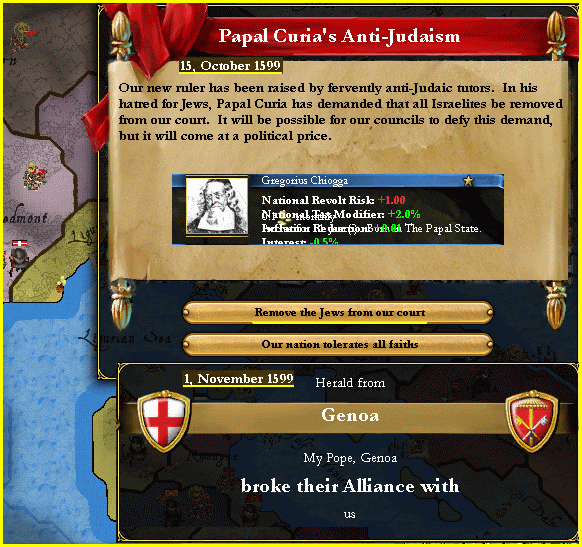
Brothers
The incidents played into the Protestants’ hands so both Papal and Imperial institutions worked hard to bring back at least a semblance of normality. Jan III realised he had pressed too hard and this time he was more willing to negotiate rather than impose the new Pope. He would not have Camerlengo Adria taking the post however. This led to a short-term impasse as yet again Camerlengo, who had withdrawn to his residence during his predecessor’s reign, appeared to be the clear papabile.
A few dispatches of envoys later however, Jan III, surprisingly eagerly accepted the candidature of Camerlengo’s brother Cardinal Ruggiero Adria. Both the Emperor and the Camerlengo thought they had outsmarted the rival. Through his spies Jan III knew the younger Adria was a sort of hermit, in his ascetism and self-loathing so detached from reality, the Emperor hoped even if he would not be obedient he would be passive. The Camerlengo realised there was something wrong with his brother: he went through sudden mood swings, after experiencing an abnormally elevated, usually short, phase, he would sunk into a kind of bleak stupor. And that was the phase Ruggiero was in when he was elected Alexander VII. The Camerlengo assumed he would be able to control his Pope-brother; and initially it seemed he was right. (Alexander’s stats represent the Camerlengo, otherwise I could not justify the course this Pope took)
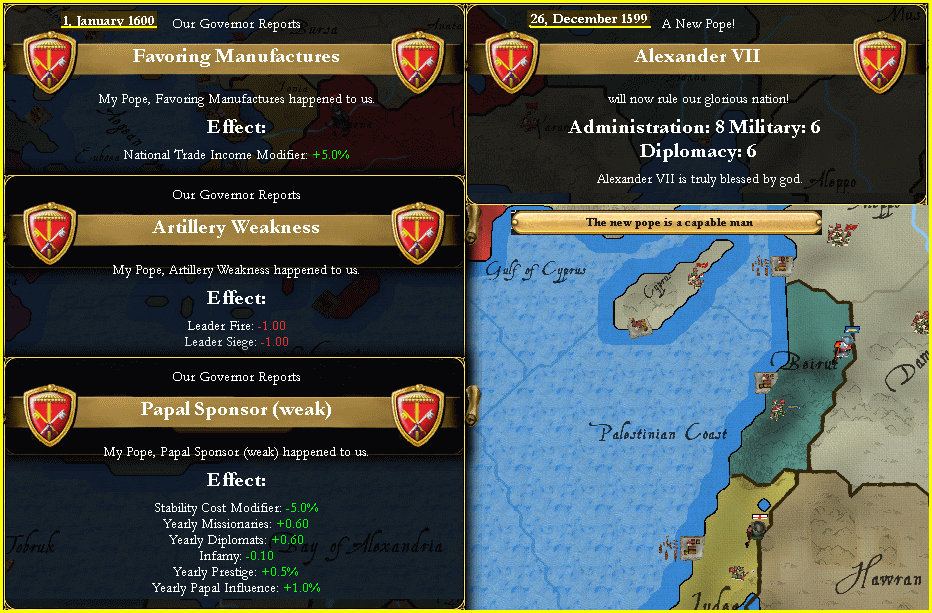
The Camerlengo was a schemer seasoned by the Ancona conclave crisis and its aftermath, and an able administrator, who in fact managed the state during Marcellus II’s pontificate. He was aware there was no better way to help people forget about the scandalous death of Hadrianus VIII than the ancient way: bread and circuses. He launched sumptuous celebrations of his brother’s elevation, which coincided with the festive week between the Christmas and the New Year of 1600. Where there had been angry mobs of anti-Semitists now was the veritable vanity fair. One could buy any exotic wares, see the relics of saints or enjoy either commedia dell’arte performances or freak shows, the Camerlengo made sure this jubilee was rather jolly than moral in tone.
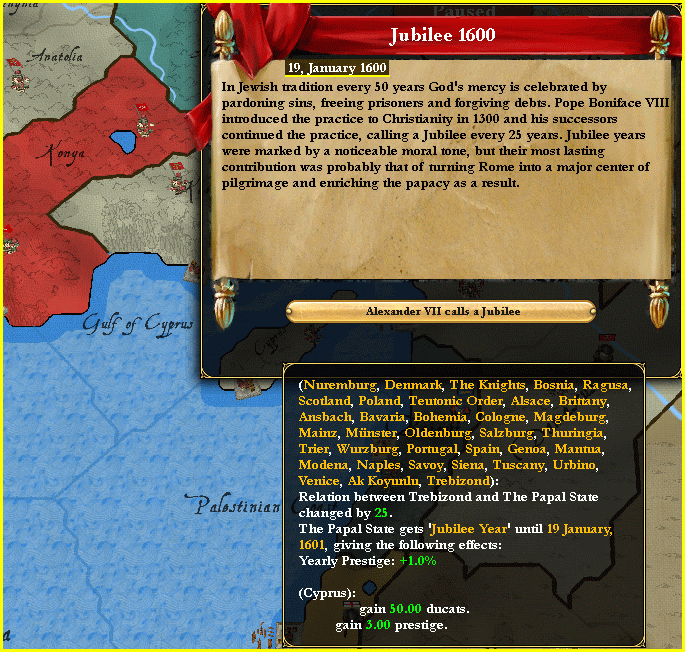
Chasing Dreams
The popular legend argues it was on seeing a copy of Theatrum Orbis Terrarum (an innovative publication: a consistent and high-quality cartographic format: the atlas) that Alexander VII was roused from the persistent feelings of sadness and hopelessness that had made him so inactive. The sense of adventure and mystery the maps evoked shook him up and led to a sudden state of euphoria. He experienced an increase in energy and a decrease in the need for sleep; he was said to have been spending all nights long pondering on the maps. The inaccuracies in them, especially as to the way the borders were drawn in Levant and the extent of the Patriarchate of Van triggered the inevitable: Alexander VII wanted yet another Crusade. (the oddest mission possible I got a while back, perfect timing I reckon to carry it out; a mad pope has been suggested by JacktheJumper, credits go to him)
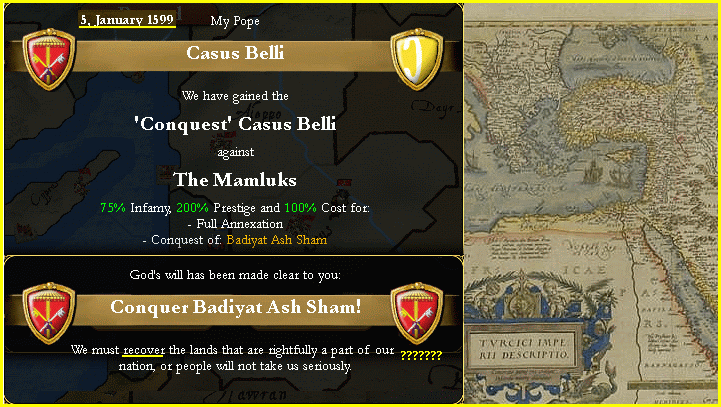
No doubt Alexander VII’s judgment has become impaired, based on misrepresentations in the Ortelius Atlas, but he felt he had been chosen, he was on a special mission. He started talking of ‘putting things right’ and he became unstoppable in his grandiose even if delusional schemes. The Camerlengo was alarmed by his brother’s unexpected frantic call for action. The worry was justifiable as Alexander VII’s hyperactivity was accompanied by pressured speech, short attention span and the mention of ‘voices’. And despite the Camerlengo’s efforts to hush the whole thing up or to contain his brother and confine him in his Papal palace rooms, Alexander VII found followers who helped him to sneak out and announce the call for the Crusade.
Having heard the pope’s call, an ill-coordinated motley collection of either religion-driven or plunder-hungry adventures: bankrupted traders, younger sons of lower landed nobility, unpaid mercenaries, thrill-seekers and generally a riffraff of all sorts gathered in Rome (many actually lingered after the jubilee). They marched to the port where, intimidated, four merchants gave ‘free’ passage on boats to as many of the ‘crusaders’ as were willing. The crusaders, led by His Holiness in person, headed for the towns of Levant and, from there, beyond.
The sudden turn of events caught the Camerlengo and the Curia horror-stricken and completely unprepared. It is most certain the slowness of reaction was due to the utter confusion and not, as the Camerlengo’s enemies alluded, Cardinal Adria’s ploy to get rid of his Pope-brother in order to take his place. By the time the Papal States officially decided to participate in the affair, the coastal cities of Levant had stopped receiving news about the crusaders. It just could not have worked out. A band of ill-prepared adventurers with next to nothing of martial training, let alone competent military leadership wandering into the deserts stood no chance of survival; Alexander VII perished along with his followers. (you can see how recklessly I played this conflict, the Mameluks pose no threat but their allies could punch; of course there’s very little logic in conquering this province, a border with QK is mostly unwelcome, but a mission is a mission and a core is a core)
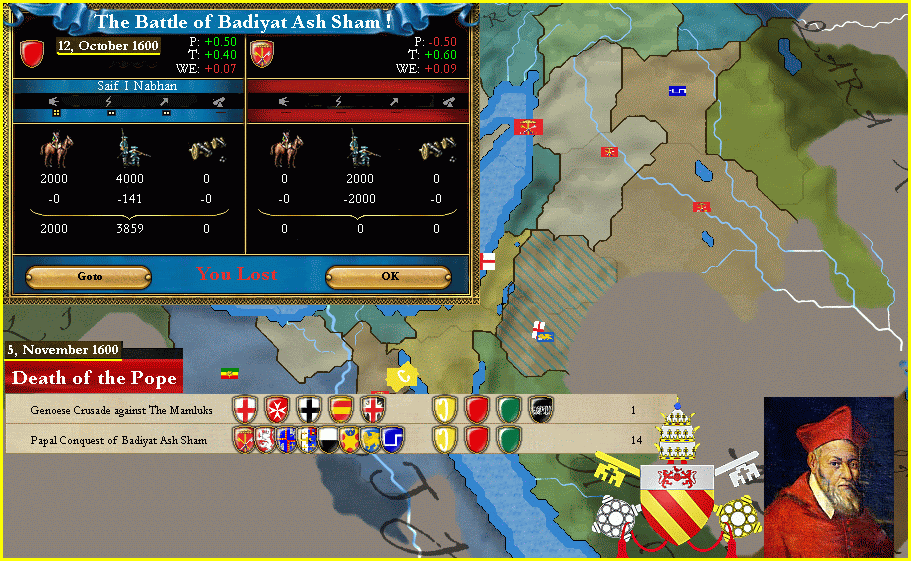
Alexander VII vanishes
Yet this was not the end of the conflict. Just when the news of Alexander VII’s and his adherents’ disappearance reached the cities of Levant so did regular soldiers of the Papal States, Venice and even Genoa, which – although no longer an ally – would not risk any commotion in its Levantine holdings. These quickly did away with any Muslim uprisings brought about by the failure of the ill-conceived Alexander VII’s venture, and marched on thirsty for plunder.
Militarily, Alexander VII’s folly did not cost the Papal States that much. However, as a serious diplomatic blunder it deteriorated the Papal States international position even further. It was the second time Jan III’s hopes to subordinate the Papacy to his schemes failed and it was obvious the Emperor would not bear to take another chance. The independent Genoa’s reaction as well as the general hostility of smaller Italian states towards the eastern bias (an issue of its own) jeopardised the Papal dominance on the peninsula. And the negative impact on the Papal authority, both spiritual and temporal, was tremendous.
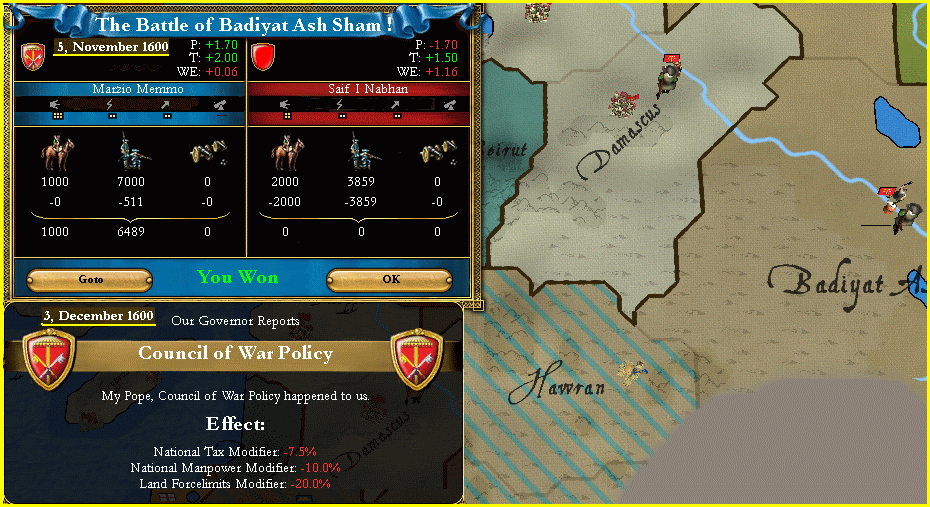
And yet Alexander VII had to be proclaimed dead, his body was never to be found, for the conclave to commence; something his brother, for political reasons, was reluctant to do. It was clear now both the Emperor and the Camerlengo had miscalculated while assessing the chances of Alexander VII’s servility; still the latter failed to keep his brother in check too. He needed time to regain his authority against Imperial pressure. Contemporary sources tend to label Alexander as ‘mad’. In the Protestant camp he was alluded to be addicted to opiates (the assumption reinforced by the fact that the territory contested and ultimately gained by the Papal States in this war turned out to be a major producer and transit route for opium). It is impossible to ascertain what made Alexander VII tick, the latest studies hint at bipolar disorder, though the hypothesis of addiction has not been ruled out.
Treasury / yearly income: 480d / 84,22
Merchants: 5 in Thrace: 84.56/580.63 and 5 in Alexandria: 76.95/528.12
Fleet: 5: 5 cogs
Army: 21k Reformed tercio; 7k Gallop cavalry
Manpower / discipline: 30.932 / 114.90%
Army / navy tradition: 47.80% / 0.00%
Prestige: 99
Stability: +2
Infamy: 0.00/23.00
War exhaustion: 0.74/24
Last edited:
well that was brilliant stuff ... really like the consequences of you playing the consequences of your popes ... and does this start to hint at an eviction from Italy & firm reorientation to the Eastern holdings (or is that reading far too much into a few hints?)
I really liked this update. I think this proves you can write something very interesting out of an awkward game situation. That mission is indeed weird. Also, the player in me is sad because Alexander VII had such nice stats... Are you still going to go for that core?
The mission system does take some liberties with what should be yours just because it happens to be by your borders. But once again, you made the most of it story-wise. I imagine the patriarch of Constantinople must have been just as furious at this rushed operation.
EDIT: Congrats on your silver OscAAR! Well deserved, although 'Nec Temere' is now your second-best AAR... Golden OscAAR next year with this one!
EDIT: Congrats on your silver OscAAR! Well deserved, although 'Nec Temere' is now your second-best AAR... Golden OscAAR next year with this one!
Last edited:
A very interesting, if short-lived, pontificate. It just goes to show the dangers of trying to control a puppet whose words have the force of Divine Truth!
I'm starting to feel sorry for the Camerlengo - what a mess he now has to clear up!
I'm starting to feel sorry for the Camerlengo - what a mess he now has to clear up!
The Anti-Semitic ruler event is always an awkward one, especially in AARs. I like how you played this Pope, crazy seems like a good way to go considering his traits. Also, damn, you need to get a military idea soon.

